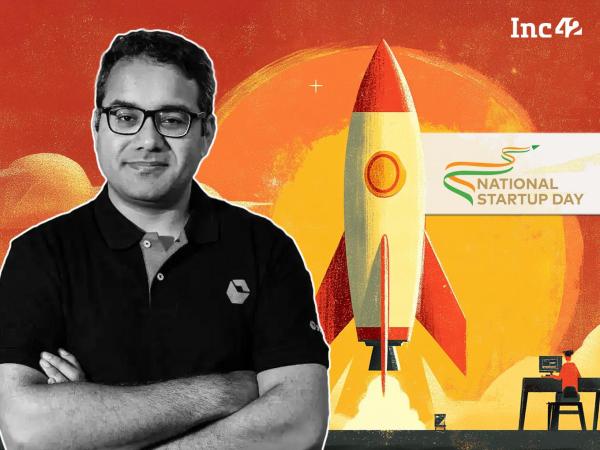

India’s National Startup Day which is celebrated annually on January 16, recognises and promotes the vibrant startup ecosystem in the country. This year marks the fourth edition and many believe this is the most pivotal time for a nationwide spotlight on startups
On the eve of National Startup Day, Kunal Bahl cofounder and chairperson at Snapdeal told Inc42 that the Indian startup ecosystem has not only expanded dramatically in terms of numbers and funding but has also played a crucial role in job creation and innovation.
A recently published report mentions that the Indian startup ecosystem will contribute nearly 1.5% to India’s GDP, injecting around $120 Bn into the economy by 2030.
But there’s a whole lot of room to grow even beyond this, and Bahl believes India has room for 2,500 listed new-age tech companies by 2050.
The founder mentioned that National Startup Day gives us a chance to celebrate how far the startup ecosystem has come, crediting not just entrepreneurs, but also consumers, investors, and policymakers for their collective role in building and sustaining it.
“National Startup Day is a celebration of everything that the ecosystem stands for—the rails that support it, all the people who work at startups (because they are the most important people who built this), the consumers who have given startups a chance to survive and thrive, and the investors who support these startups,” Bahl told Inc42.
“I feel milestones must be celebrated because it’s hard to achieve what we have achieved as a country. Yes, we’ll have a lot of successful companies and a lot of listed New Age companies. But let’s not forget, up until a few years ago, there were serious doubts about the sustainability of the startup ecosystem, particularly whether we’d be able to build any enduring listed companies. A lot of those questions have now been put to rest.”
Pointing out the digital distance travelled by the ecosystem between 2007 when Bahl started and today, Bahl said, “In 2007, when I started, there were five to seven million internet users in India. Now, we are close to one billion. A lot of that growth has happened in the last 10 years after the internet revolution post-2017.”
Founded by Bahl and Rohit Bansal in 2010, Snapdeal earns revenue by rendering services and delivering products. In 2022, the ecommerce marketplace was clubbed into parent company AceVector, along with its subsidiaries like SaaS startup Unicommerce and private label play Stellaro Brands.
Among these, Unicommerce went public in 2024, and is currently trading at a market cap of INR 1,580 Cr, having seen the ups and downs of the public markets.
From Policies To The National Startup DayUnderlining that we don’t give enough credit to our government, Bahl emphasised the government’s role in building a supportive environment for startups through innovative infrastructure, favourable policies and financial support.
Among these are the digital public infrastructure aka the India Stack, DPIIT’s various measures to recognise startups and offer tax benefits, the central government’s as well as the INR 900 Cr seed fund addressing early-stage funding gaps.
Bahl believes these funds have taken India to this current stage of maturity, and created a strong domestic bedrock of capital. The National Startup Day is another feather in the cap, as it centralises attention on startups.
He added, “Without such domestic funding, our ecosystem would remain overly dependent on international markets, subject to the volatility of global funding cycles like funding winters and funding summers. While global markets still influence us, having a robust domestic foundation reduces the dramatic impact of external economic shifts.”
While the Snapdeal cofounder praised the government’s role in abolishing the angel tax, he also sought changes around ESOP regulations. The founder also called attention to the outdated rule prohibiting promoters and founders from holding ESOPs, and hoped that the next phase of Startup India will address these gaps.
Evolving Ambitions Of Indian FoundersThe IPO spirit is well and alive in India, backed by improving policy changes, and the government’s efforts to ease the public market route for startups.
Previously, founders aimed for acquisitions or exits through M&As, but IPOs have changed the reality. Today, there is a clear ambition among all founders to build enduring public companies while remaining profitable.
“When we meet startups at the earliest stages, we ask them, ‘What do you want to do? What do you want to create?’. The answers are strikingly different now. All of them, without exception, want to create a public company. This mindset was unheard of until two or three years ago. Back then, the response was more like, ‘We’ll figure it out,’ or ‘Maybe some global company will buy us.’ It was always about acquisition or finding an exit strategy,” the founder noted.
This forms the crux of his idea that India has room for 2,500 tech companies joining the public markets in the next 25 years.
“We are already seeing signs of this in the startup ecosystem, but I believe it is still very much the tip of the iceberg. The number (2,500) sounds ambitious right now because we have only 30 or 40 listed startups, but remember, people didn’t think we’d even reach that number a few years ago,” he added.
His optimism is fuelled by two factors. First, he pointed out that Indian public markets are characterised by a willingness to support companies that go public at earlier stages compared to markets like the US which usually favour more established firms.
The post appeared first on .